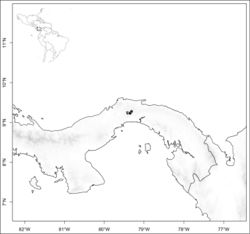Conostegia jefensis
| Notice: | This page is derived from the original publication listed below, whose author(s) should always be credited. Further contributors may edit and improve the content of this page and, consequently, need to be credited as well (see page history). Any assessment of factual correctness requires a careful review of the original article as well as of subsequent contributions.
If you are uncertain whether your planned contribution is correct or not, we suggest that you use the associated discussion page instead of editing the page directly. This page should be cited as follows (rationale):
Citation formats to copy and paste
BibTeX: @article{Kriebel2016PhytoKeys, RIS/ Endnote: TY - JOUR Wikipedia/ Citizendium: <ref name="Kriebel2016PhytoKeys">{{Citation See also the citation download page at the journal. |
Ordo: Myrtales
Familia: Melastomataceae
Genus: Conostegia
Name
Conostegia jefensis (Almeda) Kriebel comb. nov. – Wikispecies link – Pensoft Profile
- Conostegia jefensis (Almeda) Kriebel. Basionym: Miconia jefensis Almeda, Proc. Calif. Acad. Sci. 52(4): 43. 2000. Type: Panama. Cerro Jefe, along summit road and along trail into the Chagres Valley, ca. 900 m, 19 February 1988, F. Almeda, Daniel, T. & G. McPherson 5826 (holotype: CAS!; isotypes: MO!, NY!, PMA!).
Description
Small tree 2–4 m tall with somewhat tetragonal and ridged stems in newer branches that are moderately to densely brown scurfy with stalked stellulate hairs; the nodal line present but inconspicuous. Petiole 0.3–4 cm. Leaf blade 17–43 × 8–14 cm, 5(-7) plinerved, with the innermost pair of veins usually diverging from the midvein 2.5–6 cm above the base in opposite to alternate fashion, elliptic, the base gradually tapering to decurrent on the petiole or less commonly rounded to slightly cordate, the apex acuminate to long acuminate, the margin entire to undulate, the adaxial surface sparsely scurfy-pulverulent to glabrous, the abaxial surface moderately and deciduously scurfy-pulverulent on the secondary and higher order veins. Inflorescence a terminal panicle 4.4–11.2 cm long branched at the base, accessory branches absent, brown scurfy on the branches, subulate, bracteoles 0.3–0.75 × 0.2–0.5 mm, persistent, fused and forming a nodal collar or ridge. Pedicel 0.5–2 mm. 1.25–1.75 × 1.25–1.75 mm, hypanthium campanulate, not constricted, deciduously scurfy-pulverulent. Flowers 5-merous, not calyptrate, flower buds ca. 0.3–0.5 × 0.1–0.2 mm, calyx tube 0.2–0.3 mm long, calyx lobes depressed-triangular to undulate, 0.5 mm long but concealed and barely exceeded by the exterior subulate teeth, androecial fringe present and beset with glandular hairs. Petals 2.75–3.25 × 0.75–1 mm, magenta, linear-oblong, spreading an anthesis, the apex acute, glabrous, spreading an anthesis, the margin entire. Stamens 10, 2.25–2.75 mm, radially arranged around the style, the filaments 1.25–1.5 mm long, with a geniculation near the apex, white, anthers 1–1.25 0.25–0.4 mm, oblong, yellow, the pore ca. 0.1 mm wide, somewhat dorsally inclined. Ovary 5 locular, 3/4 to 4/5 inferior, glabrous apically. Style 3.5–4.25 mm long, curving towards the apex, distance from the anther pore to the stigma 1–1.5 mm, stigma truncate, ca. 0.35 mm wide. Berry 3–4 × 3–4 mm, purple-black. Seeds 0.35–0.5 mm, pyramidate, smooth with verruculose angles.
Distribution
(Fig. 173). Endemic to Cerro Jefe in Panama from 750–1000 m elevation. Conostegia jefensis can be recognized by its reddish scurfy pubescence, strongly plinerved leaves and magenta petals. This is a puzzling species because it includes two morphotypes endemic to Cerro Jefe. The common morphotype resembles Conostegia consimilis in the decurrent leaf base but differs from it in its coarse habit, somewhat coriaceous leaves and magenta petals. The second morphotype which corresponds to the morphology of the holotype is apparently much less common and does not have the decurrent leaf base but rather a rounded to cordate leaf base. This morphotype also has the typical magenta petals of the other morphotype. Unexpectedly, the two morphotypes did not form a clade in the molecular phylogeny. The holotype matching morphotype formed a strong sister relationship to another Cerro Jefe endemic, Conostegia peltata. Lack of resolution and more samples of each morphotype are needed at this time to further confirm the possibility that they represent different taxa.
Specimens examined
PANAMA. Panamá: Una milla después de la Eneida, Región de Cerro Jefe, Correa and Dressler 946 (MO, NY, PMA); P. N. Chagres, sendero hacia Cerro Jefe que sale de la urbanización Altos de Cerro Azul, Kriebel and Burke 5659, 5669 (PMA, NY).
Taxon Treatment
- Kriebel, R; 2016: A Monograph of Conostegia (Melastomataceae, Miconieae) PhytoKeys, (67): 1-326. doi
Images
|

